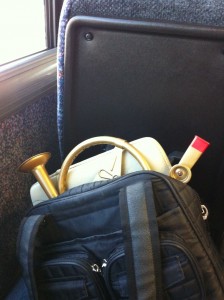The day dawned bright and clear – the complete opposite of the previous day’s sturm und drang, as the budding young musician Corzoo would call it. Then he would quote the New Grove Dictionary of Music and Musicians definition for me, just in case I had forgotten about that dramatic, stormy period in German literature and music. I went about my morning routine with the added tasks associated with packing for a substantial trip, but when I hadn’t heard a single peep from the young lad Corzoo, I thought I had better investigate.
There he was, tucked in bed looking quite peaked.
“Corzoo! What is wrong, my little friend? You look positively green!”
“I didn’t sleep a wink and my valve section feels funny,” he moaned.
“I do believe I can identify with that. I didn’t sleep half the night, and I have a bit of a rumbly in my tumbly as well.”
“Really – you too?” he perked up a little.
“Yes, indeed! What I mean to say is, I can’t be certain, but it just might be a very natural phenomenon that occurs when one is about to go on a great adventure.”
“This is natural?” he asked in disbelief.
“Yes, quite! Many people call it ‘travel-day jitters’ but I’ll bet you can come up with a better term for it, being the energetic wordsmith that you are.
“I know!” He now sat up straight and his eyes looked a little brighter. “It can be called nothing less than embarkation excitement!”
“Bravo! That is an excellent description. And how would the protagonist of a great expedition go about the morning of his embarkation?”
“He would start his day as he does every other day, with a scrumptious breakfast, his daily exercises, and then he would follow the packing and to-do list that he prepared the day before, I have no doubt.”
“Well then, there is no time to lose!”
He had regained some of his color, and after “breaking fast” as he liked to call the act of having breakfast, and going through his routine, his brazen copper-colored shine had returned, eradicating his former green hue.
Before we knew it, we were on the orchestra bus on the way to the airport. Corzoo was safely stowed away in my purse.
 “Psssttt, psssssssssttttt!” He peeked out of my bag. “Are we there yet?”
“Psssttt, psssssssssttttt!” He peeked out of my bag. “Are we there yet?”
“Corzoo! So soon?”
My husband Dave leaned over and whispered to him, “Fünfzehn minuten!”
“Danke schön, Herr Bilger!”
“Bitte schön!” Dave said.
Corzoo, proud of his first successful exchange in the German language and apparently satisfied with Dave’s answer, slipped back into my purse. “Fifteen minutes?” I asked.
“Yes, it works every time. That’s a trick of J. C.’s.”
“Really?” I thought to myself. Had I missed a commandment to the disciples? “Hmmm,” I thought, scanning my New Testament knowledge for something relating to the time period of fifteen minutes. Then I realized – different J.C.!
The associate principal trumpet player in the orchestra Jeff Curnow has two very cute and, I’m sure, very inquiring girls. They probably ask him a million times a car ride if they are there yet.
Then came the check-in line, the security line, the boarding-the-plane line, the line of planes for take-off. Aside from the expected lines upon lines, everything was going quite smoothly and soon we were up in the air. Our eyes were heavy from the bustle of activity during the previous days, and in short order we were snoozing.
Suddenly my stomach did a flip. Turbulence! A murmur went through the plane. I heard a distant and somewhat kazoo-like voice coming from my purse.
“Holy Mahler!!!!”
After my stomach came back to its normal place in my torso, I reached down towards my purse.
“Corzoo, I heard your exclamations. Are you alright? That was quite a bump wasn’t it?”
“Um…” he faltered, trying to regain his composure. “No, not at all. No big deal! But, can you tell me, does this happen often on planes?”
“I’m afraid so, and I must say I don’t like it one bit,” I said.
“Could you say it scares the Schumann out of you?” he said with a sly grin, waiting for my reaction.
I suppressed an involuntary snicker and reprimanded, “Corzoo!!!” Perhaps I uttered his name a bit too emphatically because the very polite oboist behind me called out, “Bless you!”
“Ahem. Oh, thank you, Peter. I must be allergic to something on this aircraft.”
I turned back to my young companion. “Corzoo,” I continued, this time quietly. “You must be careful about the way you say things. Someone might think you were about to say words very unbecoming to a proper and cultured young man such as yourself.”
“Haha! Let them! It gives me pleasure to keep people guessing,” he said with a mischievous grin.
I saw that despite the precociousness of my friend, he did possess some of the normal qualities of a young boy.
“Well, be that as it may…” I responded, keeping up a façade of indignation.
“Back to my original line of questioning,” he continued, “not that I have any use to ask this for myself, of course, but I am thinking of one day writing a great treatise on how various musicians cope with turbulence as they are flying to and fro, all around the world. And I think now is as good a time as any to start compiling my research. May I begin with you?”
“Of course, Corzoo. I’d be happy to share one or two of my strategies with you, though you must promise not to laugh too hard.”
“I treat all of my subjects with great dignity,” he replied.
“Well, it seems to me in times like these, it can often be helpful to employ the imagination. One can trick the body into thinking that something other than turbulence is happening. I would tell you what I imagine as the plane jolts up and down, but, like I said, I’m afraid you will think I am very, very silly.”
“You would be contributing to my future academic prowess,” he said with thinly veiled curiousity.
“Well, alright,” and I braced myself for his reaction. “If it’s really bad, I pretend I am on a magic carpet sailing through the clouds.”
“A magic carpet?” I could see that he was giggling at me inside. “Like Aladdin?”
“Well, maybe.” I back-pedaled a bit. “One could also think of Harry Potter on his quidditch broom.”
“Oh yes. I have heard of this Harry Potter.” Clearly, neither answer was resonating with him.
“Well, Corzoo, what could YOU imagine?”
 “The courageous Siegfried! He does not fly around, but did you know,” he said with emphasis, “that Wagner’s Siegfried comes from the Old Norse legend of Sigurd? (Which was written, by the way, in Middle High German.) Sigurd, of course, did not have a quidditch broom, but he DID have a cloak of invisibility!” He finished with a flourish.
“The courageous Siegfried! He does not fly around, but did you know,” he said with emphasis, “that Wagner’s Siegfried comes from the Old Norse legend of Sigurd? (Which was written, by the way, in Middle High German.) Sigurd, of course, did not have a quidditch broom, but he DID have a cloak of invisibility!” He finished with a flourish.
“And what would Siegfried do? How would he respond when his stomach flies up to his throat?” I asked.
“He would play his call, of course – and loudly, to make sure everyone knew he wasn’t scared of anything or anyone!”
“I believe you are right, Corzoo. That probably is what Siegfried would do.”
“Do you think, perhaps,” he continued tentatively “that the same idea could be transferred to the stage? In the case of one’s stomach doing somersaults?” He quickly added, “not that I know what this feels like. As you know, I thrive onstage. I am at my very best in the spotlight! But, you know, if I were to write a treatise one day…”
“Yes,” I replied. “I do believe that connection could be made. Except one wouldn’t be able to respond with Siegfried’s call all the time in that scenario,” I mused. “But one could still respond in a courageous way. I have heard that strategy called ‘pushing the courage button.’” I explained a little further. “The more one pushes his courage button, the more it gets accustomed to being pushed, and pretty soon, in moments of stomach somersaults, one will be all the more conditioned to be courageous – to do what one must do despite what one feels.”
“And you, Herr Bilger, was denken Sie?”
“Oh, what do I think?” he asked, sizing up little Corzoo. “Hmmm, well, picture, if you will, your mind as a — well, um, shall we say, a giant commode.”
Corzoo let out a yelp of surprised delight. As my husband had no doubt anticipated, Corzoo did indeed enjoy the same humor that so many young boys delight in.
“And anything unhelpful to your cause during the moment you must be courageous is waste. It must be flushed. Just push the lever and….”
“Kwhhoooooooooooosssssshhhhhhhh!” Corzoo provided the sound effects. He then caught himself getting a little carried away. “Well, then, if you will allow me to recap the data I have gathered from you that will appear in my pending treatise on dealing with turbulence, whether on a plane, or inside the brain…”
We listened attentively.
“Tactic one: employ the imagination. Meaning, turn the situation around in the mind so that one has a different perspective.”
We nodded.
“Tactic two: practice responding with courage, like Siegfried, or like Harry Potter.”
“Yes – whoever appeals to you,” I said.
“Tactic three: anything unhelpful that crosses your mind goes ‘Whoooossshhhhh’ down the toilet.” He rattled his valves with particular delight at this one.
“Excellent summary of the data, Corzoo.” I congratulated him. “You have much to share with your future readers. You no doubt will discover many other helpful and valid tactics as you do more investigating, but this is a very good place to start.”
“Well, then, off I go to cogitate,” said Corzoo. “Shall I quote Webster’s definition of cogitate for you?”
“No thank you, Corzoo. I believe we need no reminder that you are a thinking young man!”
With that he slipped back into my purse. All was quiet in our travels for a while. Towards the end of the flight, however, as we went over some stormy weather and jolted up and down for several minutes, I could have sworn I heard a faint, buzzy voice coming from my purse below the seat in front of me.
“Woooohoooo! Here I am! Ich bin Siegfried! Here to save the day! Dah Daah d-Dah Dah Dah Dah Dah Dah Daaaaaahhhhhhh!”

2 Responses to Embarkation Excitement and Soaring Siegfried: Corzoo’s European Adventure Continues